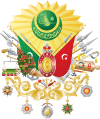Şehzade Mehmed
This article needs additional citations for verification. (April 2016) |
| Şehzade Mehmed | |
|---|---|
 The tomb of Şehzade Mehmed inside Şehzade Mosque | |
| Born | 1521 Topkapı Palace, Istanbul, Ottoman Empire |
| Died | 6 November 1543 (aged 21–22) Manisa Palace, Manisa, Ottoman Empire |
| Burial | Şehzade Mosque, Istanbul |
| Issue | Hümaşah Sultan |
| Dynasty | Ottoman |
| Father | Suleiman the Magnificent |
| Mother | Hürrem Sultan |
| Religion | Islam |
Şehzade Mehmed (Ottoman Turkish: شهزاده محمد; 1521 – 6 November 1543) was an Ottoman prince (şehzade), son of Sultan Suleiman the Magnificent and Hürrem Sultan.[1]
Life
Şehzade Mehmed was born in 1521 at the Topkapı Palace in Istanbul, while his father campaigned at the Siege of Rhodes (1522). In 1537 he joined his father on his campaign at the Siege of Corfu. And in 1541 he and his brothers, Şehzade Selim and Şehzade Bayezid, accompanied their father on his campaign to the Siege of Buda. Mehmed also participated in the successful Siege of Esztergom alongside his father in 1543.
He was assigned to rule the sanjak of Manisa in 1541 after his half-brother Şehzade Mustafa was sent to Amasya from there. This shows how much Suleiman favoured Mehmed over Mustafa, and suggests that the sultan intended to make Mehmed the heir-apparent to the throne. Mehmed's only child, Hümaşah Sultan, was born (1540 or 1541) in Manisa.
Death
Şehzade Mehmed died on 6 November 1543 at Manisa Palace in Manisa, probably of smallpox. It is worth noting that Mehmed died the same year he went to battle along his father at the Siege of Esztergom. After his death, his body was taken to Istanbul for burial. Later in 1544, his younger brother Selim (the future Selim II), replaced him as the governor of Manisa.
Afterward, Suleiman had the famed imperial architect Mimar Sinan build the Şehzade Mosque in Istanbul to commemorate his death, the mosque will later be Mehmed's final resting place. Also, Suleiman composed an elegy for his beloved son and ended the poem with the line "Most distinguished of the princes, my Sultan Mehmed" in which the total numerical value is the year of his son's death.[2][3] The fact that Mehmed's death offered Suleiman his first major opportunity to serve as an architectural patron may also have given later Ottomans reason to believe that Mehmed was the favored one. The fact that Suleiman had not only commissioned a mosque for Mehmed, but have it built in Istanbul as if he was a sultan (given that şehzade were buried in Bursa according to the custom) reflected how much the sultan loved his son.
In popular culture
In the television series Muhteşem Yüzyıl, Mehmed is played by Turkish actor Gürbey İleri.
See also
- Ottoman Empire
- Ottoman dynasty
- Ottoman family tree
- Line of succession to the Ottoman throne
- List of the mothers of the Ottoman Sultans
- List of consorts of the Ottoman Sultans
- Ottoman Emperors family tree (simplified)
Further reading
- Peirce, Leslie P., The Imperial Harem: Women and Sovereignty in the Ottoman Empire, Oxford University Press, 1993, ISBN 0-19-508677-5 (paperback).
References
- ^ Peirce, Leslie P. (1993). The Imperial Harem: Women and Sovereignty in the Ottoman Empire. New York: Oxford University Press. ISBN 0-19-508677-5.
- ^ "SULEYMAN THE MAGNIFICENT - POET". Web.archive.org. Archived from the original on 2006-03-09. Retrieved 2017-02-26.
- ^ "Archived copy". Archived from the original on 2016-04-28. Retrieved 2016-04-16.
{{cite web}}: CS1 maint: archived copy as title (link)

